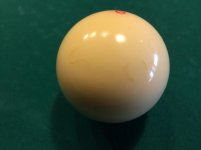@jimmy- thanks pal :thumbup:
@bic- so much of pool is mental, isn't it? you also bring up a great point about letting the other guy break potentially being an advantage.
@derek- what you said about the broken ribs/shane is funny, and knowing shane's break, probably wise! there is definitely luck involved in pool, but the more we practice/play, the luckier we get?!
@pat- skill-wise, I agree there are tougher shots out there to hit, but what seems to increase the difficulty of the break is how often it's hit, and how potentially critical that shot is to the outcome of the game. other posters have intelligently pointed out that lesser players might not need to worry as much about making balls, getting a good shot, squatting the cue ball, etc., but at the highest level we've seen matches decided by the break, haven't we? even if breakers only have a slight advantage winning games, couldn't that still decide the outcome of a match? ps shout to atlarge for all the stat-posting- if you see this, weigh in?
@bob- you're right, my og post did not refer to 14.1 or one-pocket. I will have to look this schofield chap up- sounds interesting. I also didn't know that phenolic tips damaged the cue ball, but have read that balls can lose mass after being hit so much. same with cue balls or do they crack or ?
@luxury- I think there's truth in what you say..the break is more of a physical shot, and efren, while so collected athletically just about everywhere else, just doesn't look like he enjoys hitting it. sometimes I watch him and it almost looks like he resents having to break, and that he'd rather just start with the balls open. I don't know, but it's interesting to think about.
@mitch- agree that a z shot in traffic requires a lot, but how often do you have to hit that one?
what @black said...
@sjm and @jrc- without question, breaking is only part of the game, and a good player should be familiar with all the techniques you all mentioned. @sjm in tennis, players interviewed after they've won or lost a match, will usually point out what worked and what didn't, i.e. serve, return, forehand, backhand, court surface, weather, critical points, etc.
of course pool is different, but what you say is interesting. personally, I would love to hear more from pool players, but they certainly aren't given near as grand a platform as tennis players are.
not sure if "good luck with your game" was meant for me, but I'll take it so thanks

